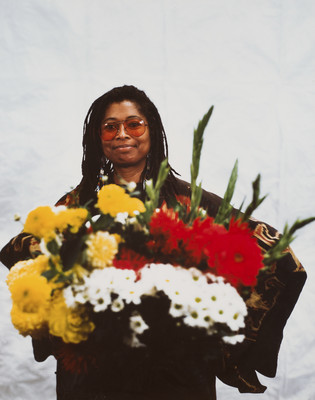Maud Sulter
Born 1960 Glasgow, Scotland
Died 2008 Dumfries, Scotland
Biography
Maud Sulter was a Scottish-Ghanaian artist, poet and curator whose practice interrogated the representation of Black women in the histories of art, photography and the media. Sulter grew up in Glasgow and moved to London at the age of 17 to study at the London College of Fashion. She later earned an MA in Photographic Studies from the Derby School of Art. In the early 1980s she co-founded the Blackwomen’s Creativity Project which resulted in the 1990 publication, Passion: Discourses on Blackwomen’s Creativity. It was published by Urban Fox Press, the imprint Sulter founded with artist Lubaina Himid as ‘a revolutionary new press for the more radical 90s’.In 1985, Sulter published her debut poetry collection As a Blackwoman. That same year she took part in the landmark exhibition, The Thin Black Line, at the Institute of Contemporary Arts in London, curated by Lubaina Himid. In 1999, Sulter opened a gallery in London, named Rich Women of Zurich, where she exhibited her own works and those of women artists and artists of colour, including Claudia Clare (whose work is also represented in the WAC).
Artwork Information
Phalia (Portrait of Alice Walker) (1989)
Phalia (Portrait of Alice Walker) is part of Sulter’s 1989 series Zabat. The series, which Sulter described asa ‘diasporan family portrait’, comprises nine photographic portraits of Black female artists, writers, performers and activists dressed as the Ancient Greek Muses. The artist challenges traditional representations of the Muses in Western art: rather than their usual attributes, these Muses hold objects which interweave the histories from Africa, America and Europe.
In her guise as the Muse, Alice Walker is dressed in a poncho with an African print and carries a bouquet of flowers. Her bouquet recalls the figure of Laure, the Black servant, in Edouard Manet’s 1863 painting Olympia. It also makes reference to Alice Walker’s collection of writings, In Search of Our Mothers’ Gardens: Womanist Prose (1983). The poncho and rose-tinted sunglasses reflect the fashions of 1960s flower power. And the colours in the bouquet – red, yellow and green – are the same as those in the Ghanaian flag, a reference to Maud Sulter’s heritage. The Muse’s name, Thalia, is deliberately misspelt in the title of the work. Phalia is in fact the name of a town in Pakistan. Sulter’s play with words points to the interconnectedness between global cultures and geographies.


